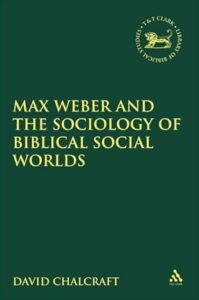CHALCRAFT, D. Max Weber and the Sociology of Biblical Social Worlds. London: T&T Clark, 2009, 224 p. – ISBN 9780567027580.
O volume fornece novas leituras weberianas e reconstruções de processos sociais e culturais no antigo Israel e no judaísmo formativo, conforme evidenciado nos testemunhos literários e materiais da sociedade.
testemunhos literários e materiais da sociedade.
Ele coloca o Ancient Judaism de Weber no contexto de Weber considerado como um todo e estabelece que há mais no legado de Weber nos estudos bíblicos do que a confiança no texto do judaísmo antigo sugere.
Os leitores são apresentados aos temas centrais da sociologia de Weber, incluindo suas posições metodológicas, e são guiados por uma série de estudos que utilizam os conceitos e teorias de Weber relacionados à lei, carisma, estratificação, ética do trabalho, desencanto e racionalização em relação aos mundos sociais bíblicos.
Essas aplicações são consideradas criticamente, e o objetivo geral é estabelecer como seria constituída uma abordagem weberiana ao mundo bíblico antigo, ao mesmo tempo em que integra a abordagem de Weber com o melhor da crítica contemporânea das ciências sociais e, quando necessário, desenvolver uma postura neo e pós-weberiana em relação a certas variáveis sociais e processos sociais.
David J. Chalcraft é Professor de Sociologia na Liverpool John Moores University, Reino Unido. Seus estudos de Bíblia foram feitos na Universidade de Sheffield e de Sociologia na Universidade de Oxford. Faz uma leitura socioantropológica da Bíblia.
 The volume provides new Weberian readings and reconstructions of social and cultural processes in ancient Israel and formative Judaism as evidenced in the literary and material remains of the society. It places Weber’s Ancient Judaism into the context of Weber’s considered as a whole, and establishes that there is more to the legacy of Weber in biblical studies than reliance on the Ancient Judaism text suggests. Readers are introduced to the central themes in Weber’s sociology, including his distinctive methodological positions, and are taken through a series of studies that utilize Weber’s concepts and theories relating to law, charisma, stratification, work ethics, disenchantment and rationalization in relation to Biblical social worlds. These applications are considered critically, and the overall aim is to establish what a Weberian approach to ancient Biblical would be constituted by at the same time as integrating Weber’s approach with the best in contemporary social science criticism and, when necessary, to develop a neo- and post – Weberian stance in relation to certain social variables and social processes.
The volume provides new Weberian readings and reconstructions of social and cultural processes in ancient Israel and formative Judaism as evidenced in the literary and material remains of the society. It places Weber’s Ancient Judaism into the context of Weber’s considered as a whole, and establishes that there is more to the legacy of Weber in biblical studies than reliance on the Ancient Judaism text suggests. Readers are introduced to the central themes in Weber’s sociology, including his distinctive methodological positions, and are taken through a series of studies that utilize Weber’s concepts and theories relating to law, charisma, stratification, work ethics, disenchantment and rationalization in relation to Biblical social worlds. These applications are considered critically, and the overall aim is to establish what a Weberian approach to ancient Biblical would be constituted by at the same time as integrating Weber’s approach with the best in contemporary social science criticism and, when necessary, to develop a neo- and post – Weberian stance in relation to certain social variables and social processes.
David J. Chalcraft has long been associated with the interpretation of the life and work of Max Weber, being a co-founder of the international journal ‘Max Weber Studies’ co-editor of ‘The Protestant Ethic Debate: Max Weber’s Replies to His Critics 1907-1910’ (Liverpool University Press, 2001) and of ‘Max Weber Matters: Interweaving Past and Present’ (Ashgate, 2008). He has also contributed to the growing field of social scientific biblical criticism.